COVID 19 Vaccines Campaign – Update and reply from JCVI

On the 18th of December, the JCVI replied to the Open Letter that Learning Disability England and partners sent to them in November.
Stronger, Louder, Together!

On the 18th of December, the JCVI replied to the Open Letter that Learning Disability England and partners sent to them in November.
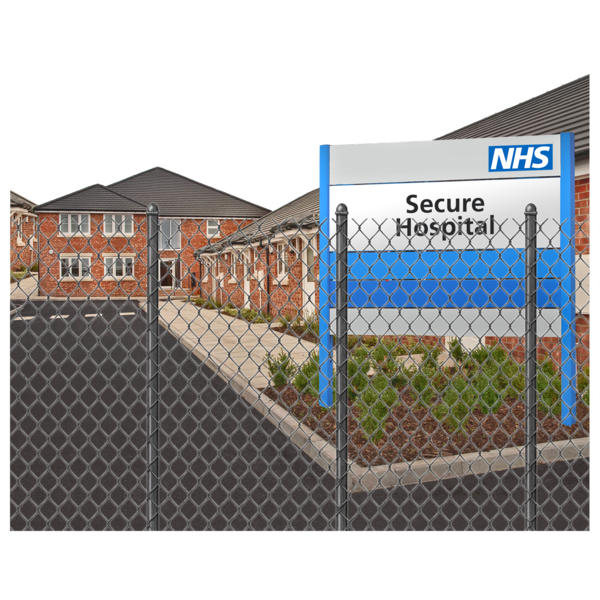
People with a learning disability or autism may be kept in hospital or a treatment unit because of the way they have behaved.
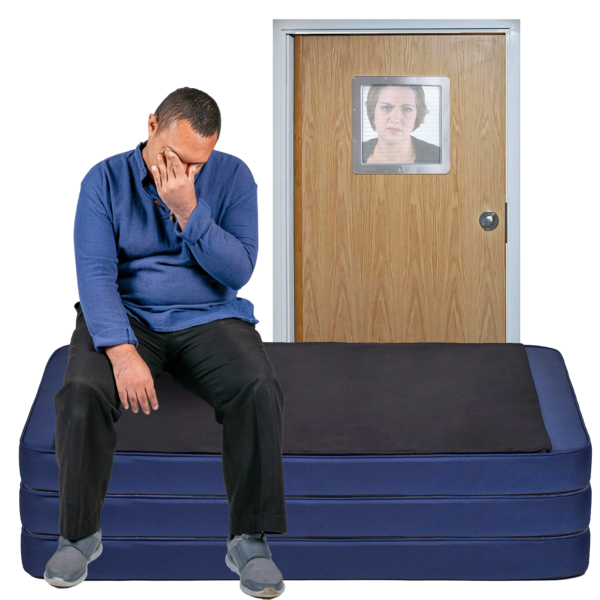
Sometimes these people are held for too long, making the person with a learning disability and their families very unhappy.
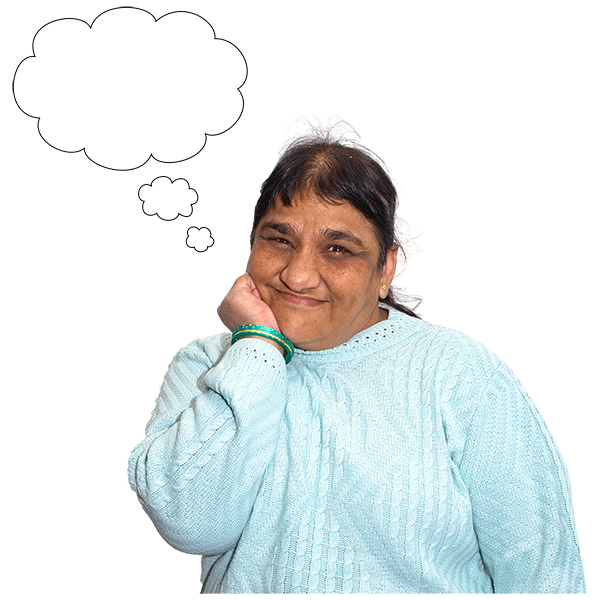
There have been some changes to how the Department for Health and Social Care lead on the work to stop people going into specialist hospitals or help people leave after treatment with good community support.
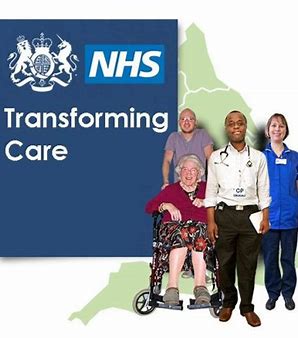
This has been called the Transforming Care programme before.
They are now calling all the work Building the Right support.
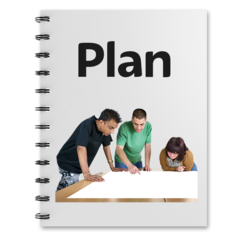
This is the name that has been used before for the national plan.
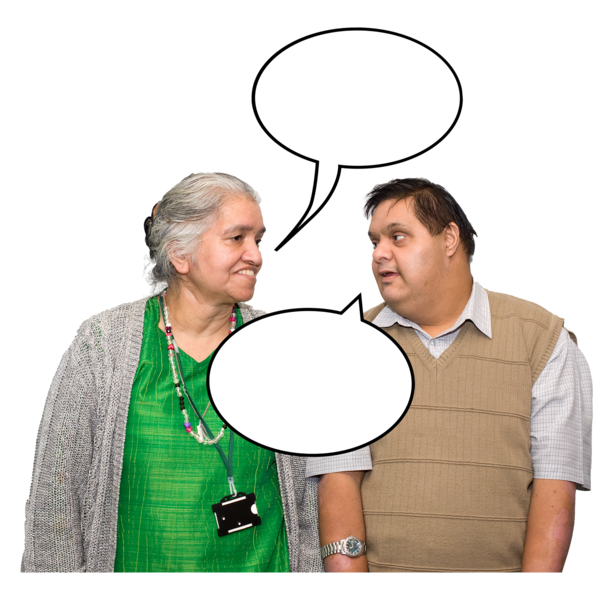
The national plan came from the Building the Right Support evaluation in 2018.

What has changed
How the work is checked has changed. There will now be:
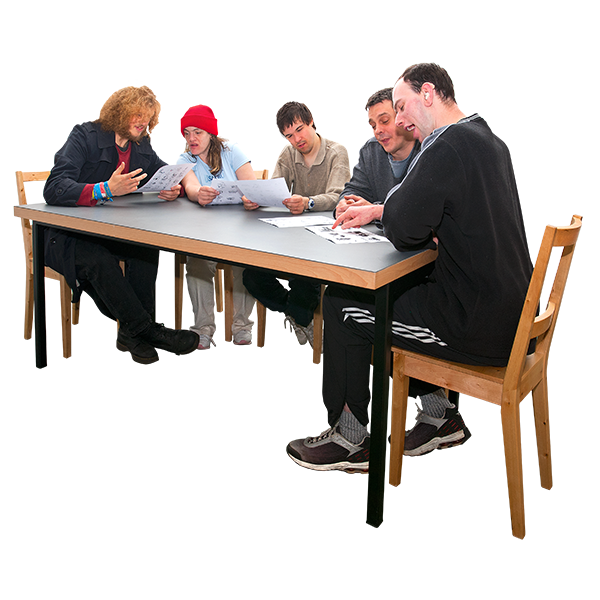
A Delivery Board chaired by the Minister of State for Care, Helen Whately.
The Delivery Board met for the first time in February 2021 and will continue to meet every 3 months.
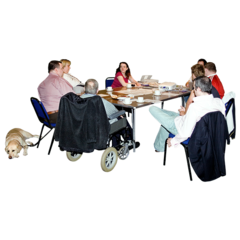
An Advisory Group of people with lived experience and their families – supported byHealth and Wellbeing Alliance partners.
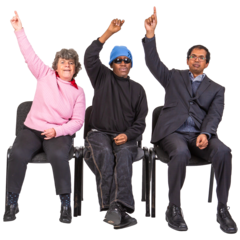
A Stakeholder Update Forum .
The Forum will meet quarterly, and brings together stakeholders to share updates and to provide advice and challenge.

Learning Disability England is part of the stakeholder group and will share regular updates with members.
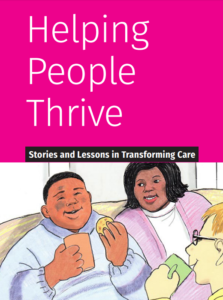
To help stop people from being admitted to secure units and kept there for too long, a guide called Helping People Thrive was created.
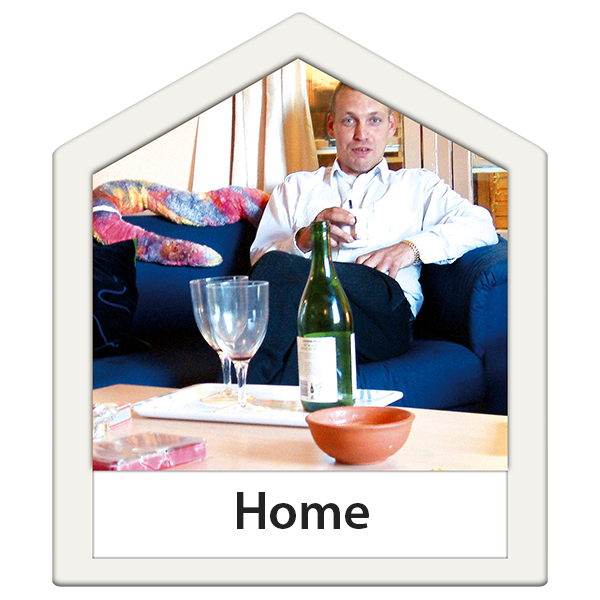
Helping People Thrive features stories about people with a learning disability or autism who were kept in hospital for too long but now live happily in their own home.

Helping People Thrive also features advice for people who work with and support someone with a learning disability.
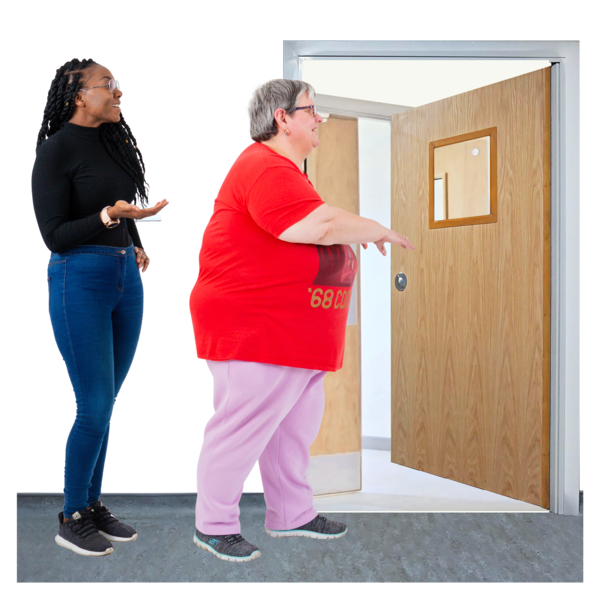
This advice tells them how they can help stop people with a learning disability from being kept in hospital or a treatment unit for too long.
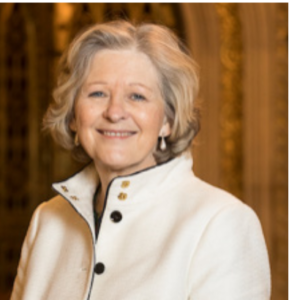
Helping People Thrive was created by the Department of Health and Social Care with a lady called Baroness Sheila Hollins.
Baroness Sheila Hollins is a professor who studies how people with a learning disability think.
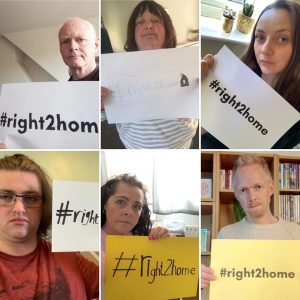
#right2home is a campaign to keep the Whorlton Hall scandal on the political agenda, and press the government to act on its promises.
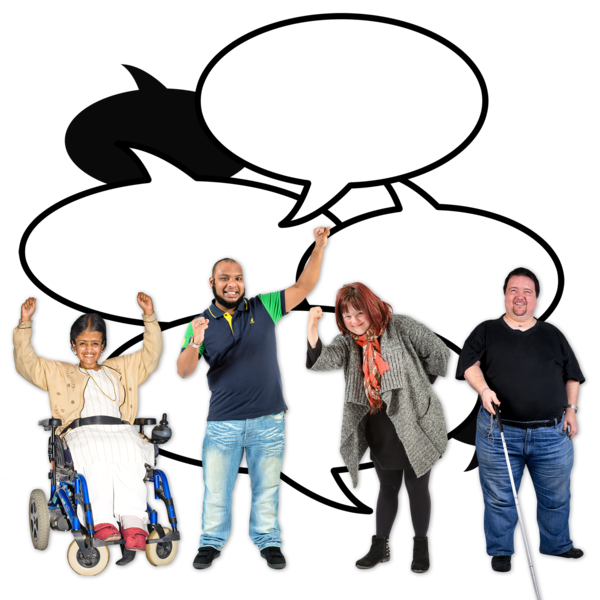
It is led by self advocates and family campaigners.
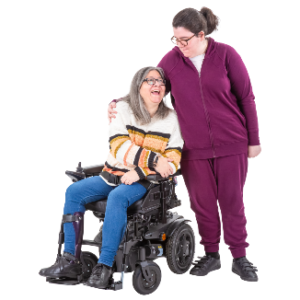
#right2visit is a website of useful resources from the #right2home campaign.
The resources are to help people and families understand visiting rights during the Coronavirus pandemic.
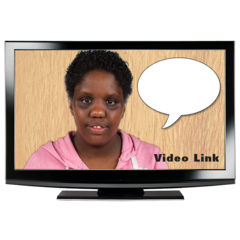
Simone Aspis, Director of Changing Perspectives, has made a VLOG about the challenges people living in institutions are facing during the pandemic.

We Are Human Too is a campaigning group made up of self advocates with learning disabilities in the North East.
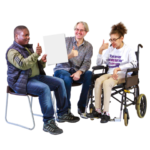
The group was formed after the abuse found by CQC at St Johns hospital in December 2020.
You can find out more by watching We Are Human Too’s video here.
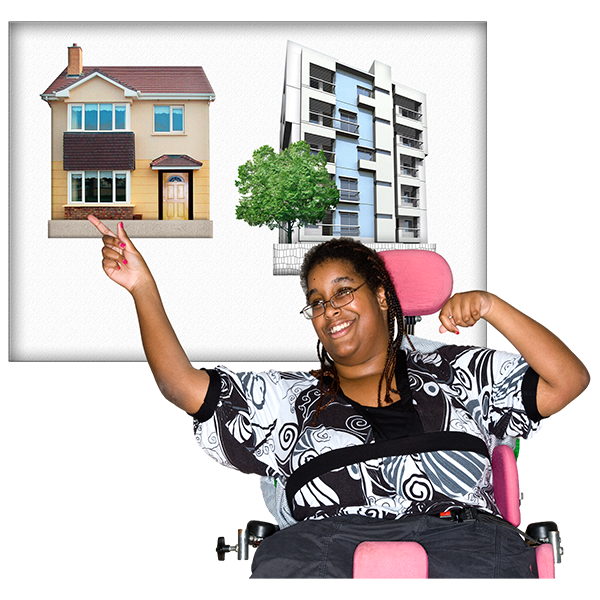
Do you now live at home after being kept in hospital for a long time?
Do you know someone like this?

If you were kept in hospital for a long time but now live at home, we would love to hear your story.
To share it with us, please email info@LDEngland.org.uk and tell us a little bit about yourself.

You can also call us on 0300 111 0444 for a chat about your story.
Thank you.

Ian Davies and Chris Hatton have written to Jeremy Hunt, the Chair of the Health and Social Care House of Commons Select Committee and Greg Clark , the Chair of the Science and Technology House of Commons Select Committee.
Ian Davies is a self-advocate and founding member of Northamptonshire People First.
Chris Hatton is Professor of Social Care at Manchester Metropolitan University.

Universal Credit
Universal Credit affects learning disabled people more than other groups of people. We’ve been worried that people with learning disabilities haven’t been included when talking about those effects.
We’ve been talking to members about how universal credit has affected them.
We’ve started working with others to make sure people voices are heard and support is accessible and inclusive.
You can read our full report here.

Sleep in payments
We have started this work as part of the #Solvesleepins Alliance
#SolveSleepIns September 2019 Update
HMRC Sleep-in Guidance
HMRC have made this 10 minute webinar offering guidance on the rate of pay given to staff who work sleep-in shifts. The webinar
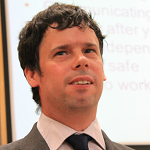
On 22 December Scott Watkin, Co Chair of Learning Disability England’s Representative Body, appeared on Good Morning Britain.
Learning Disability England has worked with many partners on different projects. We have worked together on research projects, producing practical resources and within various groups on shared goals. You can find out about all the different individual projects we have been involved in and access any resources or outcomes from them below.
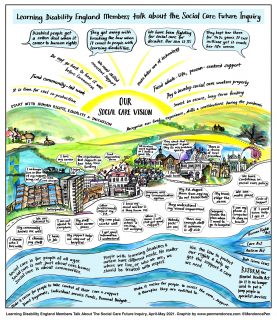
Guest blog as part of the future of social care series by John Casson at L’Arche
Watch John and Rebecca Tucker talking about these issues in a video here
We cannot let COVID turn back the clock for disabled people.
It’s time to say it. The COVID response is telling people with disability: You’re different – a patient to look after, not a person. A problem to manage, not a citizen.
It’s the return of the old institutional mind-set that says: you’re vulnerable, and we know what’s best.
At L’Arche, and in Learning Disability England, we’re part of a freedom movement of people with and without disability, against this disabling mind-set. In our UK L’Arche Communities, we build friendship, freedom and full lives together.
But in lockdown we’ve received hundreds of pages of regulations, to run people’s lives in care and supported living from Whitehall.
The effect on daily life is always clumsy. Often it is discriminatory, harmful, and nonsensical:
The rules are undermining the relationships that are the bedrock of our quality of care. And they tell people, “you’re a patient with paid carers, not a person with friends”.
Yes, we need to understand how COVID threatens people with disability. We need to make society safe for people to live their lives. But this means enabling people, not fencing them in in and removing their rights.
So how do we go forward, not back?
We have learnt in L’Arche it can be done – if we trust people and empower them to make the decisions for their lives. In the pandemic, our Communities were best able to survive and thrive in the early weeks before the tide of rules began, when they made their own risk-based decisions.
People with learning disability – and those who support them – are among the most disempowered and overlooked groups. But if we are empowered, there is literally no-one better to make these complex choices.
Let’s exit lockdown with people with learning disability enabled, not boxed in.
Read more about Learning Disability England’s work on the future of social care here
The government have changed the rules since Gary wrote this blog. We have updated the links where the rules have changed.
The new government rules include
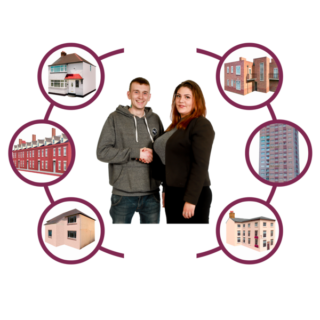
Our work on housing choices includes hosting a post with JMS Trust that helps people set up their new home.
Find out more about JMS trust here
We are working on questions about
This includes trying to understand the numbers of unexpected deaths and incidents reported to CQC by providers and shared in the BBC file on 4 programme in February 2019.

We have written a report on what we have found out so far and are doing next
You can read the July 2019 update here
There is an easy read summary at the start of the report

Learning Disability England took part in a webinar with Housing LIN in July 2021.
The session was a HAPPI Hour session about building the right homes and support.
Watch the recording and the ‘chat’ report from the session here
There is also a blog by Kevin from L’Arche on what they changed after Joe Ulleri died in hospital. You can read that here
Thank you to all the members so far who have shared information, ideas or examples from their work
If you want to share anything or tell us what you do after things go wrong in a service or what you want to see services do please get in touch

Blog by Jayne Knight, Learning Disability England member
“REACH – constantly aspire for better” Reflections on Supported Living today

Blog by Dame Philippa Russell, DBE, a family and friends member.

This is part of the Future of Social Care series of members’ thoughts and views.
Find out more about Learning Disability England’s work on the future of social care here
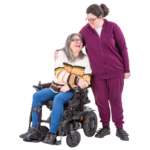
I am a ‘veteran carer’ (55 years experiences, good and bad)!
But in the 18th month of the covid-19 pandemic, I am not sure that I am on the winning side of the war.
My son Simon and I both feel the pressure of our ‘shielded’ lives.
Simon’s usually busy life (and mine) changed overnight. So many of his daytime activities vanished and grateful as we are for the gradual recovery of people and places, there is still the real terror of what would happen if either of us got ill.
Simon does not like masks. He needs face recognition for good conversations. I echo his wish to ‘see people smile again!’ But we cover our faces and brave the outside world.

‘Shielding’ sounds so cosy and safe, but it can become a prison.
Many of us will need a ‘re-entry’ strategy to cope again with what once seemed very safe and ordinary lives. For now we tread carefully.
In the pandemic, we have learnt some very good things about community and human kindness.
But many of us also feel that we have experienced ‘house arrest’ and solation and it’s hard.
Now, we need urgent shared conversations’ about how we will live through and beyond the covid-19 crisis.
The Government will no doubt publish a 2021 Winter Plan and I would like to see people with learning disabilities and their families contributing to the big conversation that we need in order to survive the winter and of course to finally reform social care.

What would ‘Recovery’ from covid-19 really look like for myself, my son and Learning Disability England members?
The 2020 Government’s Winter Plan asked that we should ‘put co-production at the heart of decision-making, involving people who receive health and care services, their families and carers.’
The 2020 Adult Social Care Covid 19 ask Force emphasised the need to ‘find new and innovative ways of providing outreach, virtual contact, short breaks and wider support’.
So, as a way of moving forward to recovery and in the true spirit of co-production, can I suggest that we create our own ‘Covid Recovery Collection’?
Stories matter and good things always happen from small beginnings – so can we provide the can-do- evidence that will inspire, encourage and enable the world to open up safely again?
Maybe we need to change the language when we talk about social care. TLAP, with Making it Real, underlines the importance of real communication. The Germans, reforming their social system a decade or so ago, talked about ‘Lebenshilfe’, getting a life.
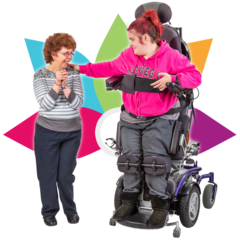
We have lost so much ‘life’ over the past 18 months, but let’s see that loss as an opportunity as well as a challenge.
The Paralympics start in Tokyo next week – challenge and opportunity for many disabled people.
But as a competitor, Tony Parsons, said to the Sunday Times today, we still need an international campaign to end the invisibility of so many disabled people.
Many of us did feel invisible during the pandemic but now is our opportunity to come forward and share in planning a different future. What we say can become what we do.

This month is the anniversary of the most frightening night of my life.
In the last year of the Second World War, aged three years old, I saw my house bombed – everything destroyed, crushed under rubble.
I remember standing screaming until a kindly emergency worker took my arm. ‘Don’t worry love’ he said, ‘sometimes when things get knocked down, they get rebuilt better!’
He was right, the house was rebuilt ‘better’ and the UK got the NHS and the welfare state.
In many ways Covid 19 has been a third world war. But remembering my house being rebuilt and the NHS being created with no money whatsoever, I have hopes for the future.
Let’s become visible and codesign both the social care future we want and importantly speak up about how we recover from Covid.

As my war time rescuer said, ‘We can rebuild better’.